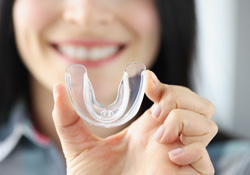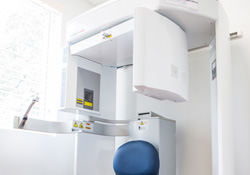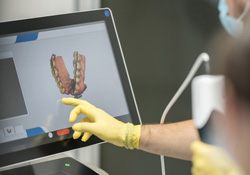Dental Implants – Fort Mill, SC
Reliable Tooth Replacement That Lasts

When it comes to longevity, stability, and chewing strength, traditional tooth replacements like dental bridges and dentures leave much to be desired. That’s why the vast majority of dentists, including our very own Dr. Priya Chougule, believe that dental implants are the definitive way to restore your lost pearly whites. By replacing your teeth from the roots up, dental implants from our Fort Mill, SC dentist look and feel just like the teeth you used to have. To schedule your dental implant consultation, call our Southlake Family Dentistry team today!
Why Choose Southlake Family Dentistry for Dental Implants?
- Partnered with Expert Oral Surgeons and Periodontists
- Individually Tailored Treatment Plans from an Experienced Dentist
- Mess-Free, Comfortable Digital Dental Impressions
What Are Dental Implants?

Dental implants replicate the roots of missing teeth – something that dentures and bridges alone cannot do. Made from titanium or other biocompatible materials, a dental implant is a small cylindrical post that is embedded in your jaw using a minor surgery. Your jawbone then grows around the implant, allowing it to firmly support any number of prosthetic teeth for many years, decades, or even a lifetime!
The 4-Step Dental Implant Process

How dental implants work in Fort Mill requires going through a four-step process. You cannot expect your experience to be the same as another patient’s; however, you can expect that both of you will be required to undergo a thorough consultation before moving on to dental implant surgery, the placement of metal abutments, and finally, receiving your customized restoration. If you’re interested in learning more about each step, keep reading.
Initial Dental Implant Consultation

First, Dr. Chougule confirms your eligibility for dental implants and determines how many posts you need. She also lets you know whether you need preparatory work such as bone grafting in your jaw. These factors are determined during the consultation phase after a comprehensive examination is complete. Based on the status of your oral health, overall health, and jawbone density, you will learn if you can move forward with dental implant surgery right away or not.
Dental Implant Surgery

Southlake Family Dentistry will perform all other aspects of your dental implant process; however, you’ll be referred to a local expert to have the implants surgically positioned in your jawbone. This part of the process involves receiving local anesthesia before small incisions are made in the gums. This exposes the underlying bone, making it easier to place each implant post. When finished, we will close the gum tissue and place protective healing caps over the area(s).
Dental Implant Osseointegration/Abutment

The third phase of treatment involves going on to recovery after your surgery. Osseointegration is the process of the implants fusing to your jawbone, and it can take up to six months to complete. Afterward, a metal abutment is attached to the top of the post, as this helps to secure the restoration to the implant post once put in place.
Delivery of Dental Implant Restorations

The final step is to receive your custom restoration. But before we can put it in place, we take impressions of your mouth and use them to design your dental crown, bridge, or denture. Then, once it is ready for placement, we secure that restoration onto your abutment. What you have then is a full, functional, and natural-looking smile you can enjoy.
Dental Implant Failure and Salvage

Despite their high success rate, it’s possible for dental implants to fail under specific circumstances. Fortunately, even if the worst-case scenario happens, we’re ready to help; we can figure out what the underlying cause of the failure is, and we can walk you through your options for treating the problem and restoring your oral health. Please don’t hesitate to contact us as soon as you suspect that there’s a problem with your dental implants!
Learn About Dental Implant Failure and Salvage
Benefits of Dental Implants

Every year, hundreds of thousands of people get dental implants. When you learn about the many benefits offered by this treatment, its booming popularity becomes easy to understand! Dental implants have the potential to significantly improve your oral health and functionality, but even more than that, they can have positive effects for your overall health and your quality of life. Continue reading to gain deeper insight into how you might personally be able to benefit from this state-of-the-art form of tooth replacement.
Day-to-Day Benefits

Dental implants could improve your daily life in several ways:
- No dietary limitations. Dental implants provide a very strong chewing force, so you can use them to enjoy virtually any food, including tough and chewy items that are usually off-limits with traditional dentures.
- Stress-free maintenance. In many ways, caring for dental implants is similar to caring for natural teeth. You can expect an easy and efficient oral hygiene routine.
- Clear speech. Your teeth play an important role in your enunciation. Dental implants can help you to speak clearly and with confidence.
- An attractive smile. Our team carefully designs dental implant restorations to complement each patient’s face. You can expect your new smile to be both beautiful and natural-looking.
Health Benefits

After you get dental implants, your oral and overall health may benefit in a number of ways:
- Jawbone preservation. When a tooth goes missing, your jawbone begins to shrink as it loses the stimulation provided by the tooth’s roots. Dental implants function like natural tooth roots to keep your jaw healthy.
- Improved digestion. Your body’s digestive process begins in your mouth. Thanks to the improved chewing power of dental implants, you can help your body to extract as many nutrients as possible from the food you consume.
- Protection for the remaining natural teeth. Implants can serve as placeholders that prevent your remaining natural teeth from drifting out of place.
- No tooth modifications. Unlike with traditional dental bridges, dental implants do not usually require that any nearby teeth be modified.
- Emotional wellness. A strong, confident, and functional smile may help you to thrive in social situations, which can boost your mental and emotional health.
- A longer life. Studies have shown that extensive tooth loss is associated with a reduced life expectancy. Replacing your teeth with dental implants could lower your risk of health issues that might shorten your life.
Long-Term Benefits

Dental implants start to provide benefits shortly after treatment is complete, and they can continue to work in your favor for decades to come.
- A long lifespan. With proper care, dental implants have the potential to last for many decades. The restorations on top of implants are also quite durable.
- Financial value. Even though dental implants have a higher upfront cost than traditional tooth replacement options, their cost per day over the course of a few decades makes them a truly top-tier value.
- Save time. Since implants are easy to care for, you may seldom have to make unplanned trips to see our dental team.
Who Dental Implants Can Help

As long as you meet some basic requirements, dental implants can replace any number of lost teeth! During your consultation, our team will learn about your oral and overall health before we start designing your treatment plan. Even if you are not a candidate for dental implants right away, you may become one after some preparatory treatments. Really, almost anyone with missing teeth can benefit from this remarkable and lifechanging treatment!
Who Is a Good Candidate for Dental Implants?

Generally speaking, candidates for dental implants:
- Have fair overall health. Your body should be well enough to handle the stresses caused by minor surgery. If you have any chronic conditions, such as diabetes, they should be well-managed.
- Have decent oral health. It is important that you are free of active gum disease and other conditions that might adversely affect your dental implants.
- Have a strong and adequately sized jawbone. We will order some scans to ensure that your jawbone is able to support dental implants.
Even if you are not initially a candidate for dental implants, it is quite likely that you could become one after some restorative procedures, such as a bone graft or gum disease treatment.
Missing One Tooth

Replacing one tooth with a dental implant is a fairly straightforward process. A single implant post can be placed in a gap. After it has had a chance to form a secure bond with the surrounding tissue, we can top it with a lifelike, custom-made crown.
This option is sturdier than a traditional bridge. Plus, unlike regular bridgework, a dental implant does not depend on neighboring teeth for support, making it the more conservative choice. In most cases, a dental implant does not require any modification of nearby teeth!
Missing Multiple Teeth

To replace several missing teeth in a row, you do not need to get an implant for each tooth. Instead, one can be placed at each end of the empty space to support a dental bridge that stays in place without wearing down any of your remaining teeth. (If you are missing just two teeth in a row, you might need just one implant post to support a crown and a neighboring artificial tooth.)
If your missing teeth are not adjacent to one another, we will explore other treatment options. For example, you might need multiple single implants or a partial denture.
Missing All Teeth

By anchoring a full denture onto a small number of implant posts (usually between four and eight), we can bring back a whole row of lost teeth at once. With implant dentures, you will never need to worry about your prosthetic slipping out of place or limiting your diet.
There are two basic types of implant dentures. You may opt for a fixed implant denture, which will stay in your mouth 24/7. Alternatively, a removable implant denture might be better for your circumstances. Our team can help you understand the pros and cons of each option.
Understanding the Cost of Dental Implants

While dental implants typically cost more at first than other methods of tooth replacement, you have to consider the long-term benefits. Because they can last for 30 years or longer and don’t require any special maintenance products like dentures do, you’ll most likely end up saving money over the years. Each dental implant case is different, and our team will help you navigate your payment options so that rebuilding your smile doesn’t break the bank.
Maintaining & Caring for Your Dental Implants

Dental implants may be prosthetic, but they still need maintenance and care to work well. The posts will fail if neglected for too long, thus ruining your treatment results. That said, we at Southlake Family Dentistry are here to ensure your new teeth last a long time! Listed below are some great tips on dental implant care in Fort Mill, which should keep your posts safe. Please keep reading to learn about them in detail, or contact us in the coming days.
Make Oral Hygiene a Priority

Dental implants depend on a healthy mouth, as surprising as that may sound. They become unstable when near cavities and infected gums, increasing the risk of treatment failure. In fact, gum disease can even loosen a patient’s implant posts until they fall out!
Given these facts, please prioritize oral hygiene. Sticking to daily brushing and flossing prevents tooth decay, gum disease, and similar issues. To that extent, your implants will be safer and less likely to fail.
Eat a Healthy Diet

While dental implants restore much of your bite force, they don’t handle junk food well. Sticky and sugary stuff like candy will often wedge itself between the posts. Once good and stuck, they’ll put you at greater risk of cavities and gum disease – conditions that can make implants fail.
The good news is that a mouth-healthy diet avoids this outcome. After all, eating meals rich in calcium, vitamin C, and phosphorus would just strengthen your jaw and stabilize your gums. They also wouldn’t contain sticky sugar that gets caught near your implants.
Break Bad Habits

Despite their durability, dental implants can (and sometimes do) fail from poor oral habits. You’ll thus want to quit or break such habits as soon as possible.
Some of the “bad” habits that risk dental implants are fairly common. For example, regular tobacco use delays treatment recovery, often results in gum disease, and worse. A tendency to chew or bite hard objects can also cause implants to break, resulting in their failure.
Protect Your Dental Implants

Dental implants can break under extreme force, so you’ll need to protect them carefully. They could otherwise fail due to various accidents.
A custom mouthguard is often the most suitable protection method. After all, a sportsguard would shield your new teeth from collisions, tackles, and other sports-related injuries. A nightguard could also stop you from grinding your teeth, ensuring you don’t break or chip your implants under pressure.
Schedule Regular Dental Checkups

However much you brush and floss, you can’t maintain your dental implants on your own. You’ll need to get regular dental checkups so your dentist can help.
Dental checkups are the premier form of preventive oral care. When you attend them often, your dentist will diagnose and treat mouth issues before they can threaten your implants. You just need to schedule the visits every six months or so.
Dental Implants Technology

The technology used during the dental implant process can go a long way toward ensuring that you’re able to enjoy the best possible outcome. A cone beam scanner makes it possible to plan dental implant placement down to the smallest detail; meanwhile, digital impressions can be used to design beautiful replacement teeth that are precisely the right shape and size. Read on for a closer look at the technology that can help you enjoy a successful dental implant treatment.
3D Cone Beam CT Scanner

A cone beam computed tomography (CBCT) scanner can be used to create a highly detailed, three-dimensional virtual representation of your mouth and jaw. Compared to regular dental X-rays, CBCT scans reveal far more information, such as how much bone density is in your jaws and where nerve pathways are located.
Using a CBCT scanner makes it far easier to determine exactly where your implant posts need to be inserted into your jaw, and it can significantly reduce the chances of an unexpected complication occurring during your surgery. On top of that, if anything goes wrong with your dental implants in the future, a CBCT scanner can be an invaluable tool for figuring out the problem.
There’s no reason to be nervous about having a CBCT scan taken. Not only is the process painless, but it doesn’t leave behind any radiation in your body. In short, it’s a safe, reliable way to get the information needed for dental implant placement.
Digital Impression System

Before our team can place a crown, bridge, or denture on your dental implants, we will need to capture an impression of your mouth. Traditionally, this would involve having you bite down on messy, unpleasant-tasting dental putty. However, that’s no longer necessary at our practice thanks to our state-of-the-art digital impression system.
Our team is able to take digital scans of your oral cavity that capture thousands of pictures of your teeth and jaw from a variety of angles. These images are then combined into a three-dimensional model of your mouth. This model will be our reference for designing replacement teeth that fit properly and look as natural as possible.
One of the most notable advantages of our digital impression system is how accurate it is. Physical impressions can sometimes come out wrong, resulting in a prosthesis that doesn’t fit as well as it should. Digital impressions are more likely to yield correct results the first time, thus ensuring that we’re able to provide you with beautiful, functional replacement teeth that you can rely on.
On top of that, many patients find digital impressions to be more comfortable than physical ones. They can also be taken more quickly, meaning you won’t have to spend as much time in the treatment chair.
Dental Implant FAQs

Dental implants are an ideal way to replace missing teeth, but they’re quite an investment, so it pays to be well-informed. Here are the answers to some of the most common questions we receive about dental implants in Fort Mill. If you don’t see the information that you’ve been looking for below, give us a call. We’d be happy to explain more about the procedure and get you started with an initial consultation.
How Long Do Dental Implants Last?
The lifespan of dental implants typically depends on the health and lifestyle choices of the patient. To ensure that dental implants last, it’s important to brush, floss, and rinse with mouthwash daily. Attend regular cleanings and checkups, and avoid chewing on anything particularly hard or sticky. With proper maintenance, dental implants can last upwards of three decades! That’s several times longer than the average traditional bridge or denture.
Does Getting Dental Implants Hurt?
The jawbone doesn’t have very many nerve endings and your mouth will be numbed with a local anesthetic before the procedure begins. You will also most likely be sedated, lowering your body’s ability to register pain. While your surgery shouldn’t hurt, your mouth may be sore for a few days afterward. This can be managed by recommended over-the-counter and prescribed pain relievers. Cold compresses can also help to numb discomfort. If discomfort worsens instead of improving after three days, give us a call!
Am I Too Young to Get Dental Implants?
The majority of dental professionals will not place implants in patients who are younger than 18. When implants are placed before the jaw has finished growing, it can interfere with further bone development and result in complications. Most people’s jaws aren’t fully developed until young adulthood. Some people’s jaws take until their mid-20s to develop. During your consultation, we will discuss whether or not dental implants are the right option for you at this time.
Can I Get Dental Implants If I’m Diabetic?
If your diabetes is under control, your odds of dental implant success are generally comparable to those of nondiabetic patients. Uncontrolled diabetes can slow down the healing process, making it harder for your dental implants to integrate with your jawbone. If you are diabetic and are interested in getting dental implants, talk to your endocrinologist or primary care doctor about getting your blood sugar levels under control beforehand.
